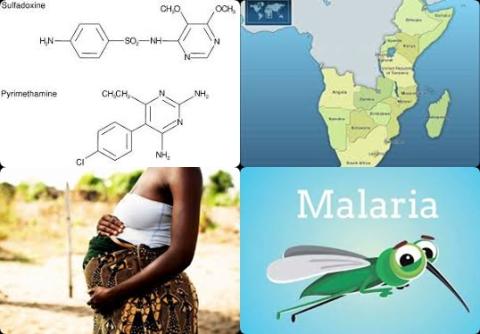
Objectives:
Without pregnancy-specific protection, an estimated 45% of 32 million pregnancies in malaria-endemic sub-Saharan Africa are exposed to Plasmodium falciparum malaria yearly, leading to 900,000 malaria-associated low birthweight deliveries and associated consequences for infant health. In these areas, WHO recommends intermittent preventive treatment in pregnancy (IPTp) with antimalarials. IPTp with sulfadoxine-pyrimethamine, the only antimalarial currently recommended for this strategy, is associated with major reductions in maternal anaemia, low birthweight and neonatal mortality. However, the effectiveness of sulfadoxine-pyrimethamine IPTp is threatened by resistance to this drug combination, particularly in east and southern Africa. Therefore, this review article has been conducted.
The goal of this review article is to assess the associations between markers of sulfadoxine-pyrimethamine resistance in P falciparum and the effectiveness of sulfadoxine-pyrimethamine intermittent preventive treatment during pregnancy (IPTp) for malaria-associated outcomes in sub-Saharan Africa.
Study design:
This review article included 57 clinical studies, with a total of 59,457 births.
A random-effects meta-analysis (clinical studies) or multivariate log-binomial regression (surveys) was carried out to obtain summarised dose-response data (relative risk reduction (RRR) [RRR = 100 × [1 – relative risk]) and multivariate meta-regression was carried out to explore the modifying effects of sulfadoxine-pyrimethamine resistance (as indicated by Ala437Gly, Lys540Glu and Ala581Gly substitutions in the dhps gene).
Results and conclusions:
The investigators found relative risk reduction for low birthweight (2.5 kg) declined with increasing prevalence of dhps Lys540Glu [p trend = 0.0060] but not Ala437Gly [p trend = 0.35].
The investigators found relative risk reduction was:
7% [95% CI = 0 to 13] in areas of high resistance to sulfadoxine-pyrimethamine (Lys540Glu ≥90% in east and southern Africa, n = 11];
21% [95% CI = 14 to 29] in moderate-resistance areas (Ala437Gly ≥90% [central and west Africa] or Lys540Glu ≥30% to 90% [east and southern Africa], n = 16) and 27% (21 to 33) in low-resistance areas (Ala437Gly 90% [central and west Africa] or Lys540Glu 30% [east and southern Africa], n = 30, p trend = 0.0054 [univariate], I2 = 69.5%].
The investigators found overall relative risk reduction in all resistance strata was 21% [95% CI = 17 to 25].
The investigators found in the analysis of individual participant data from 13 surveys (42,394 births) sulfadoxine-pyrimethamine intermittent preventive treatment during pregnancy (IPTp) was associated with reduced prevalence of low birthweight in areas with a Lys540Glu prevalence of more than 90% and Ala581Gly prevalence of less than 10% [relative risk reduction = 10%, 95% CI = 7 to 12].
However, not in those with an Ala581Gly prevalence of 10% or higher [pooled Ala581Gly prevalence 37%, 95% CI = 29 to 46, relative risk reduction = 0.5%, 95% CI = -16 to 14; 2,326 births].
The investigators concluded the effectiveness of sulfadoxine-pyrimethamine intermittent preventive treatment during pregnancy (IPTp) is reduced in areas with high resistance to sulfadoxine-pyrimethamine among P falciparum parasites, but remains associated with reductions in low birthweight even in areas where dhps Lys540Glu prevalence exceeds 90% but where the sextuple-mutant parasite (harbouring the additional dhps Ala581Gly mutation) is uncommon.
However, sulfadoxine-pyrimethamine intermittent preventive treatment during pregnancy (IPTp) is not likely to reduce malaria and malaria-associated low birthweight in areas where the prevalence of sextuple-mutant parasites, with the dhps Ala581Gly mutation, exceed 37% (the pooled estimate in the high-resistance areas). For these areas, the search for alternative strategies or drugs to replace sulfadoxine-pyrimethamine IPTp is a pressing research priority for the control of malaria in pregnancy.
Original title:
Effect of Plasmodium falciparum sulfadoxine-pyrimethamine resistance on the effectiveness of intermittent preventive therapy for malaria in pregnancy in Africa: a systematic review and meta-analysis by van Eijk AM, Larsen DA, […], Ter Kuile FO.
Link:
https://www.thelancet.com/journals/laninf/article/PIIS1473-3099(18)30732-1/fulltext
Additional information of El Mondo:
Find more information/studies on food fortification/malnutrition and malaria right here.
Intermittent preventive therapy or intermittent preventive treatment (IPT) is a public health intervention aimed at treating and preventing malaria episodes in infants (IPTi), children (IPTc), schoolchildren (IPTsc) and pregnant women (IPTp).